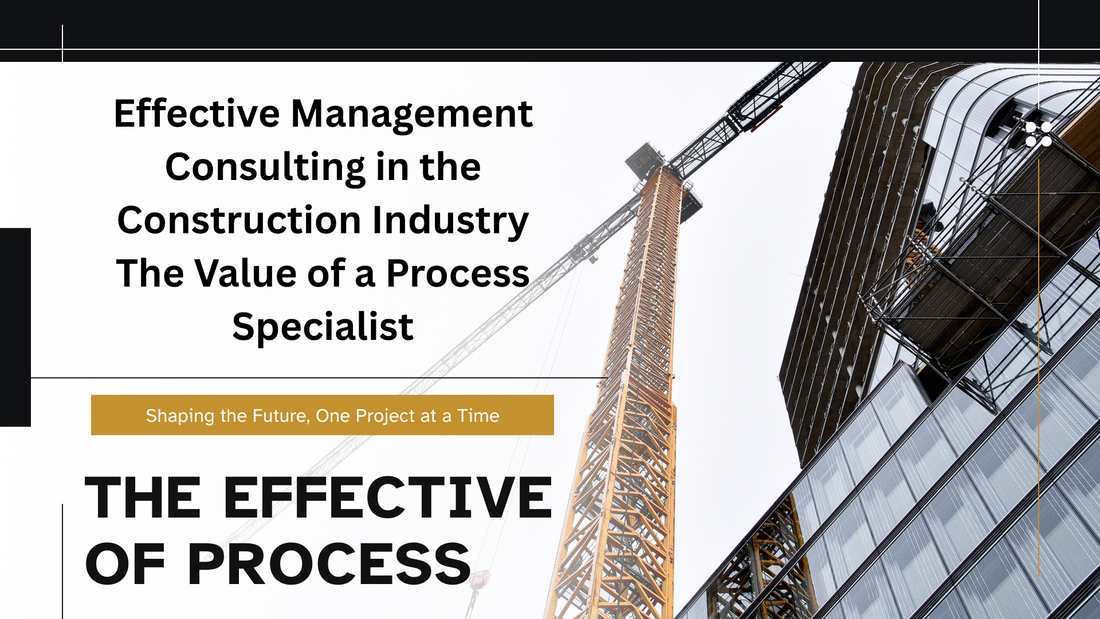
Effective Management Consulting in the Construction Industry: The Value of a Process Specialist
Share
The construction industry is one of the most complex and high-stakes environments in the world of business. Projects often involve multiple stakeholders, tight schedules, resource-intensive operations, and significant financial risks. In such a setting, effective management consulting is not a luxury—it’s a necessity.
But what truly makes a difference is when the consultant is not only an advisor but also a specialist in processes. This expertise allows the consultant to bridge the gap between strategy and execution, ensuring that construction companies achieve sustainable growth, efficiency, and competitive advantage.
Why Management Consulting Matters in Construction
Unlike other industries, construction faces unique challenges:
- Fragmented stakeholders, including owners, contractors, subcontractors, suppliers, regulators, and clients, must align.
- High uncertainty: Projects are affected by supply chain fluctuations, labor availability, and regulatory changes.
- Cost and schedule pressures: Even minor inefficiencies can lead to significant overruns.
- Technology adoption gaps: Many firms still struggle with digital transformation, ERP/CRM integration, and data-driven decision-making.
A management consultant brings an external perspective and a structured methodology to identify problems, design solutions, and implement systems that drive efficiency across the project lifecycle.
The Consultant as a Process Specialist
A process-specialized consultant doesn’t just advise; they re-engineer how work is done. Their value lies in turning construction challenges into opportunities through process-driven improvements.
1. Optimizing Project Management Frameworks
- Aligning PM practices with PMI or PRINCE2 standards.
- Creating consistent workflows for planning, execution, monitoring, and closure.
- Standardizing risk registers, dashboards, and reporting to reduce ambiguity.
Added Value: Projects are delivered faster, with fewer disputes and improved client satisfaction.
2. Enhancing Operational Efficiency
- Streamlining procurement and supply chain management.
- Reducing waste through Lean Construction practices.
- Implementing SOPs (Standard Operating Procedures) for repetitive tasks.
Added Value: Lower costs, improved productivity, and greater resource utilization.
3. Integrating Technology & ERP/CRM Solutions
- Guiding digital transformation with systems like Odoo, Zoho, or Microsoft Dynamics tailored for construction.
- Ensuring seamless integration between financials, HR, project tracking, and customer relationship management.
- Leveraging data analytics to predict risks, track KPIs, and improve decision-making.
Added Value: Real-time project visibility, faster reporting, and reduced administrative overhead.
4. Improving Stakeholder Communication & Collaboration
- Establishing clear communication protocols across contractors, engineers, and clients.
- Using collaboration tools and dashboards to ensure transparency.
- Training leaders on effective negotiation and conflict resolution.
Added Value: Fewer disputes, stronger trust, and better alignment across all parties.
5. Driving Strategic Growth & Organizational Change
- Developing scalable organizational structures for expanding firms.
- Coaching leadership teams on culture, change management, and innovation.
- Designing KPIs and performance dashboards that align daily operations with strategic objectives.
Added Value: A construction firm evolves from “project-by-project survival” to long-term sustainable growth.
Real Impact of a Process-Specialized Consultant
A general consultant may identify problems, but a process specialist redesigns the way the business works:
- Case Example: A contractor suffering from chronic project delays cut delivery times by 30% after process streamlining and ERP integration.
- Case Example: A mid-sized construction company reduced overhead by 15% when procurement and site management processes were standardized and digitalized.
- Case Example: A developer improved investor trust after implementing transparent reporting and risk assessment frameworks guided by the consultant.
Conclusion
In the construction industry, where risks are high and margins are often tight, the difference between success and failure lies in how processes are managed. An effective management consultant who specializes in processes doesn’t just advise from the sidelines—they embed systems, create efficiencies, and empower teams to deliver with confidence
